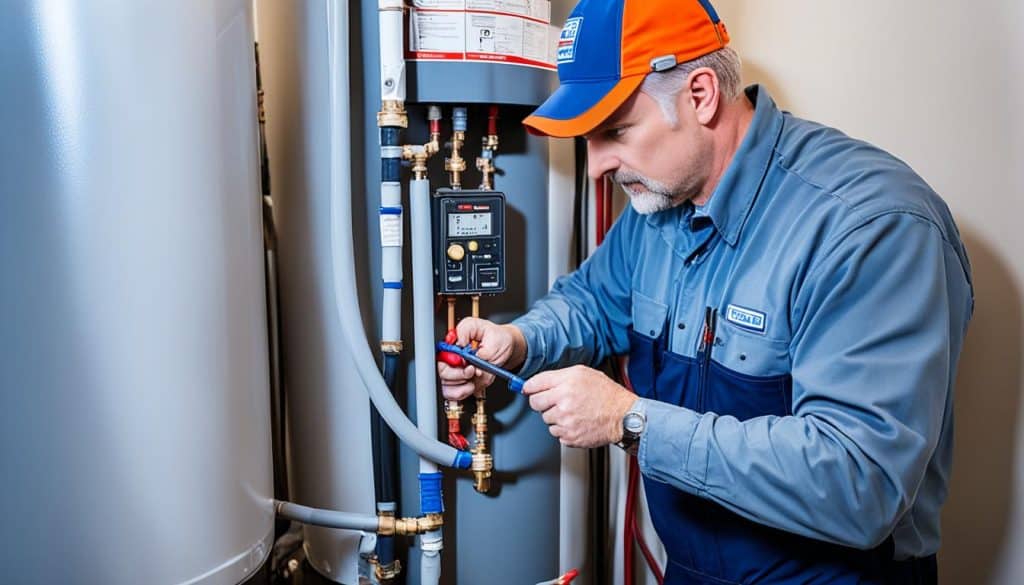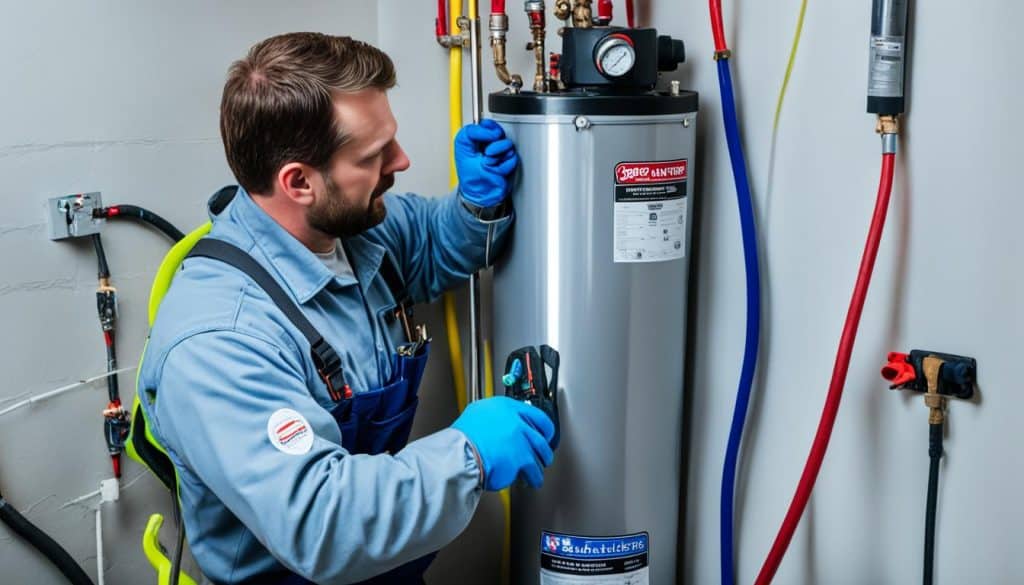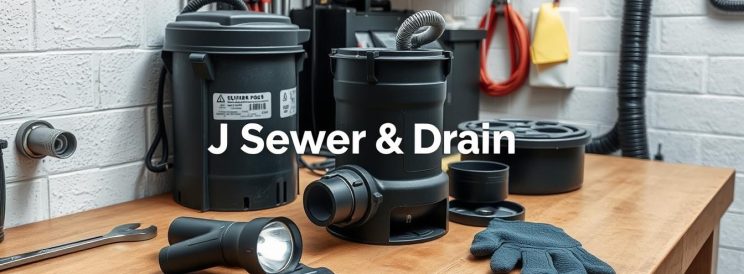Ever thought about What Maintenance Does a Water Heater Require After Installation? We count on it for hot water, but we often forget to maintain it. Regular care can make your water heater last longer and work better for years.
Water heater maintenance is key to keeping it running well. It lasts 12 years for tank models and up to 20 years for tankless ones. To avoid problems like rust and leaks, you should flush it annually, check the anode rod, and look for leaks. Companies like J Sewer & Drain Plumbing Inc. say regular maintenance keeps warranties valid and boosts efficiency.
Key Takeaways
- Annual water heater flushing is crucial to remove sediment buildup.
- Inspecting and maintaining the anode rod prevents tank rust and corrosion.
- Regular checks for leaks can avert damage and costly repairs.
- Ensuring the thermostat and valves function correctly can boost efficiency.
- Consistent post-installation water heater maintenance enhances warranty protection and longevity.
Understanding the Importance of Water Heater Maintenance
Regular maintenance is key for your water heater’s efficiency and longevity. A thorough water heater inspection is essential. It spots issues like sediment buildup and scale, preventing early failure.
Keeping your water heater in check also saves energy and protects your warranty. Water heater service helps fix small problems before they grow. This keeps your hot water flowing without interruption.
Following water heater best practices extends your unit’s life and reduces breakdown risks. This includes flushing, anode rod checks, and thermostat adjustments. Experts like J Sewer & Drain Plumbing Inc. offer detailed inspections and maintenance.
Getting expert plumbers for your water heater service is a smart move. Companies like J Sewer & Drain Plumbing Inc. in Chicago provide special deals and thorough inspections. They ensure your water heater works efficiently, saving energy.
Flushing Your Water Heater: Essential Steps and Benefits
Flushing your water heater is key to keeping it running well. It removes harmful sediments that can hurt its efficiency and cause corrosion. Regular flushing can make your water heater last longer and work better.
Why Flushing Is Important
Keeping your water heater free from sediment is crucial. Sediments at the bottom of the tank can make it less efficient and increase corrosion risk. This can lead to expensive repairs or even needing a new unit. Plus, flushing regularly can save you money on energy bills.
How to Properly Flush a Tank Water Heater
To flush a tank water heater right, first turn off the power and water supply. Then, drain the tank to get rid of all sediments. J Sewer & Drain Plumbing Inc. offers a detailed service to remove all sediments. This is a key part of keeping your water heater in top shape.
Flushing a Tankless Water Heater
 Flushing a tankless water heater is different and needs special tools and skills. Unlike tank water heaters, tankless systems need a specific way to flush them. Professional help ensures they are maintained without damage. Following these tips can prevent unexpected problems and keep your water heater running smoothly.
Flushing a tankless water heater is different and needs special tools and skills. Unlike tank water heaters, tankless systems need a specific way to flush them. Professional help ensures they are maintained without damage. Following these tips can prevent unexpected problems and keep your water heater running smoothly.
In summary, flushing your water heater, whether it’s a tank or tankless type, is vital. It keeps the system efficient and prevents costly issues. Regular flushing can save you money and make your water heater last longer.
Inspecting and Replacing the Anode Rod for Optimal Performance
Regular care of your water heater is key to its long life and efficiency. A crucial part to watch is the anode rod. This rod helps prevent corrosion inside the tank and keeps your water heater running longer.
What Is an Anode Rod and Its Purpose?
An anode rod attracts corrosive elements in the water. This protects the metal lining of your water heater tank. By corroding itself, it saves the tank from damage, which is vital for your water heater’s health.
How to Inspect the Anode Rod
It’s important to check the anode rod regularly. First, turn off the water heater and let it cool down. Then, find the anode rod at the top of the tank and remove it with a socket wrench. Look for any heavy corrosion. If it’s over 50% corroded, it’s time to replace it.
When and How to Replace the Anode Rod
Anode rods usually need to be replaced every three to five years. But this can change based on your water’s quality and how much you use it. To replace it, make sure you have the right type and size. Follow the same steps as for checking: turn off the water heater, remove the old rod, and put in the new one. This simple step can greatly help your water heater last longer.
Companies like J Sewer & Drain Plumbing Inc. offer professional water heater maintenance. They include anode rod replacement to keep your system running well.
Checking and Adjusting the Thermostat
Keeping your thermostat in check is key for your water heater’s performance and safety. It’s important to adjust it right to keep your home warm and comfortable. Plumbers from J Sewer & Drain Plumbing Inc. suggest setting it between 120°F and 140°F. This balance saves energy and keeps the water safe from bacteria.
Adjusting your water heater regularly can prevent problems and lower your bills. In Chicago, homeowners count on J Sewer & Drain Plumbing Inc. for expert help. The right thermostat settings protect your water heater and save you money.
Also, regular checks can stop leaks and extend your water heater’s life. By keeping the temperature just right, you create a safe and energy-efficient home. Let the pros handle your water heater needs for safety and savings.
Conducting Regular Visual Inspections for Leaks and Corrosion
Regular visual inspections are key to keeping your water heater in top shape. Spotting leaks and corrosion early can save you from big repairs. J Sewer & Drain Plumbing Inc. in Chicago and nearby areas does thorough checks to keep your water heater running smoothly and safely.
Identifying Common Signs of Leaks
When inspecting your water heater, look for signs of leaks. Water around the base or moisture on connections means trouble. It’s important to catch these issues early to avoid bigger problems.
Strange sounds like dripping or hissing also hint at leaks. These need quick action to prevent more damage.
Signs of Corrosion and How to Address Them
Corrosion is another big concern during inspections. Rusty connections or sediment buildup mean parts are wearing out. Fixing corrosion issues early keeps your water heater efficient and prevents major damage.
J Sewer & Drain Plumbing Inc. offers detailed checks and fixes for corrosion. They’re dedicated to quality work and offer warranties to back their services.
Testing and Maintaining the Temperature and Pressure Relief Valve
The temperature and pressure relief (T&P) valve is key for water heater safety. It’s important to keep it in good shape to avoid over-pressurization. At J Sewer & Drain Plumbing Inc., experts stress the need for an annual check-up.
They make sure these valves work right. This is crucial for your water heater’s safety.
Experts say you should check the T&P valve every year. It’s a must to avoid risks. If you ignore it, your water heater might get too pressurized, which is dangerous.
So, J Sewer & Drain Plumbing Inc. focuses on this to keep you safe. They make sure your water heater is reliable.

Taking care of the T&P valve keeps your water heater running well for longer. The team at J Sewer & Drain Plumbing Inc. knows how to follow safety rules. They make sure all valves are working perfectly.
Their careful work makes them a trusted name in Chicago. They’re all about keeping your water heater safe.
Conclusion
Keeping your water heater in good shape is key to its long life and efficiency. You should regularly flush the tank, check and replace the anode rod, and adjust the thermostat. Also, don’t forget to look for leaks and test the temperature and pressure relief valve.
By doing these things, you can avoid sudden breakdowns and expensive fixes. This makes your water heater work better for longer.
Adding professional water heater service to your routine can make it even better. J Sewer & Drain Plumbing Inc. in Chicago is a trusted name for this. They do annual flushes, anode rod checks, thermostat adjustments, and T&P valve tests.
Regular maintenance and professional help, like from J Sewer & Drain Plumbing Inc., mean hot water all the time. Your water heater will last longer, and you’ll have peace of mind. Start taking care of your water heater today to avoid future problems and costs.


